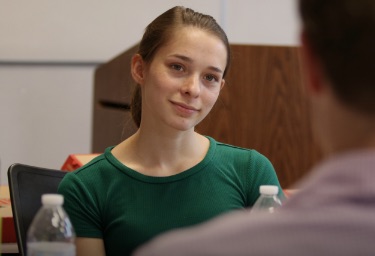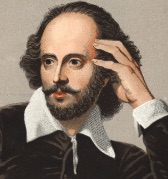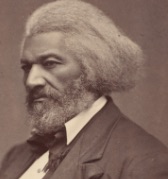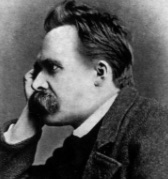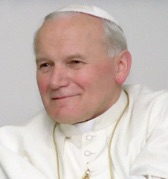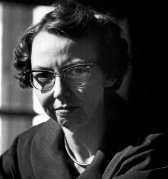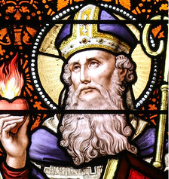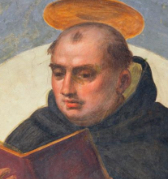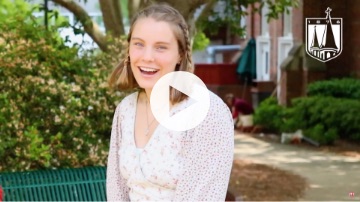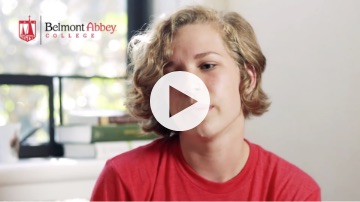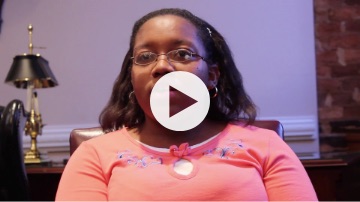The Honors College Difference
The Honors College at the Abbey is unlike any other honors program. First, we emphasize the fundamental questions of human and divine realities through the works of Ancient, Christian, and Modern thought. The answers to these questions are then placed in the context of the students’ lives, creating a solid basis for spiritual, professional and personal happiness. The Abbey Honors College provides flexibility with three options to fit your goals.
3 Options for the Honors College
Great Books Intensive Major:
120-Credit Curriculum
You devour literature and enjoy seeing the world through the eyes of authors past and present. The Great Books Intensive option was designed for someone like you. This 120-credit curriculum will not only shape your understanding of history, philosophy, religion, and much more, it will also give you a unique perspective on how to thrive personally and professionally.
Great Books Flexible Major:
90-Credit Curriculum
Want to pair the understanding of Ancient, Christian and Modern thought with other areas of study? Consider the Great Books Plus option. This 90-credit curriculum gives you room to explore 30 elective credits for a more customized academic program.
Great Books Core with Choice of Major:
78-Credit Curriculum
Whether you’ve already read some of the Great Books or you’re eager to begin, the Great Books Minor is an excellent option. You’ll explore Ancient, Christian, and Modern thought with the 78-credit curriculum while devoting 45 credits to your major. (For majors requiring more credits, students will consult with the Director of the Honors College.)
SOME OF THE Authors you will read
A Look At
THE HONORS COLLEGE VALUE
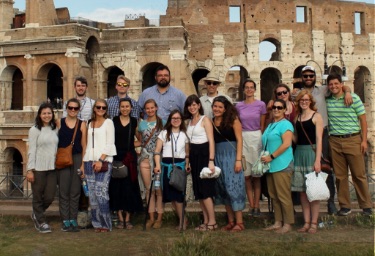
The Four Year Curriculum
1. FRESHMAN YEAR:
CLASSICAL THOUGHT
FALL SEMESTER
HO 101: A Life Well Lived (1 credit course)
HO 201: Homer and Virgil
Homer: The Iliad; The Odyssey
Virgil: The Aeneid
HO 202: Plato and Aristophanes
Aristophanes: The Clouds
Plato: Ion; Meno; Apology of Socrates; Crito; The Republic
HO 204: Greek Tragedy
Aeschylus: Oresteia; Prometheus Bound
Sophocles: The Three Theban Plays
Euripides: The Bacchae
Classical Language
GK 101: Greek I or
LA 101: Latin I
Lab Science (4 hours)
SPRING SEMESTER
HO 103: Life Well Lived II
HO 205: Greek Histories
Thucydides: History of the Peloponnesian War
Herodotus: Histories
HO 206: Aristotle
Aristotle: Nicomachean Ethics; Politics
HO 208: Euclid
Euclid: Elements
HO 207: The Romans
Plutarch: Parallel Lives (selections)
Lucretius: On the Nature of Things
Cicero: On Ends; On Duties
Livy: Selections
Al Farabi: The Attainment of Happiness
Classical Language
GK 102: Greek II (3 hours) or
LA 102: Latin II (3 hours)
2. SOPHOMORE YEAR:
FALL SEMESTER:
CHRISTIAN THOUGHT
HO 203: Trivium I: Logic & Rhetoric
Plato: Gorgias
Aristotle: Organon
HO 301: Biblical Texts I
Book of Genesis
Exodus
Book of Job
Proverbs
Ecclesiastes (selections)
Isaiah
Gospel of Luke
Acts of the Apostles
First Corinthians
HO 302: St. Augustine and St. Thomas Aquinas I
Augustine: Confessions; On the Free Choice of the Will
Aquinas: Summa Theologica and Summa Contra Gentiles (selections)
HO 303: Fathers and Doctors of the Church
St. Athanasius: Life of Anthony; On the Incarnation
St. Basil: Letter to Young Men
St. Jerome (elections)
Tertullian
St. Gregory of Nazianzen
St. Anselm: On Why God Became Man; Proslogion
Venerable Bede: Ecclesiastical History of the English People
St. Teresa of Avila: Autobiography
HO 305: Poetic Wisdom I
Milton: Paradise Lost
Swift: Gulliver’s Travels
Melville: Moby Dick
SPRING SEMESTER:
MODERN THOUGHT
HO 304: Trivium II: Poetics & Rhetoric
Plato: Phaedrus
Aristotle: Rhetoric; Poetics
HO 306: Great Texts in Early Modern Philosophy
Machiavelli: The Prince
Descartes: Discourse on Method; Meditations
Bacon: The Great Instauration; The New Atlantis
Hobbes: Leviathan
HO 308: The American Founding
John Locke: Second Treatise on Government
Articles of Confederations
The Declaration of Independence
The American Constitution
The Federalist Papers
Anti-Federalist Writings
Frederick Douglass & Abraham Lincoln: Writings and Speeches
HO 309: Textual Analysis I
Shakespeare: King Lear; Hamlet
HO 320: Poetic Wisdom II
Cervantes, Don Quixote
Goethe, Faust
Stendhal, The Red and the Black
3. JUNIOR YEAR
FALL SEMESTER:
MODERN THOUGHT
HO 311: Great Texts in Late Modern Philosophy
Rousseau: Discourse on the Origin of Inequality; The Social Contract
Hume: Inquiry Concerning Human Understanding
Kant: On Perpetual Peace; Idea for a Universal History
Hegel: Introduction to the Philosophy of History
Marx: The Communist Manifesto; The 18th Brumaire
Burke: Reflections on the Revolution in France
Mill: On Liberty
HO 312: Montesquieu and Plato
Montesquieu: The Spirit of the Laws
Plato: The Laws
HO 314: The Quest for Economic Wisdom
Smith: The Wealth of Nations (selections)
Tawney: Religion and the Rise of Capitalism
Keynes
Weber: The Protestant Ethic and the Rise of Capitalism
Hayek
Pope Pius XI: Quadragesimo Anno
Marx: Economic and Philosophic Manuscripts
Pope Leo XIII: Rerum Novarum
HO 315: Poetic Wisdom III
Shakespeare: Coriolanus; Julius Caesar; Anthony and Cleopatra
HO 324: Contemporary Philosophy
Nietzsche: Beyond Good and Evil
Heidegger: Introduction to Metaphysics, The Self-Assertion of the German University, On Plato’s Parable of the Cave
Derrida: Plato’s Pharmacy
Lyotard: The Post-Modern Condition
Rorty or Foucault: Discipline and Punish
Rosen: Hermeneutics as Politics
SPRING SEMESTER:
CHRISTIAN THOUGHT
HO 316 St. Augustine & St. Thomas Aquinas II
Augustine: The City of God (selections)
Aquinas: Summa Theologica and Summa Contra Gentiles (selections)
HO 317: Great Texts in Modern Christian Thought
Pascal: Pensees
Kierkegaard: Fear and Trembling
Newman: Grammar of Assent; Development of Christian Doctrine
Edith Stein: Finite and Eternal Being or The Science of the Cross
Pope Emeritus Benedict XVI: Without Roots; Regensburg Address; Introduction to Christianity; Spirit of the Liturgy (selections)
HO 318: Biblical Texts II
Deuteronomy
First and Second Samuel
First and Second Kings
Daniel
Jonah
Jeremiah
Gospel of John
St. Paul: Epistle to the Romans
Book of Revelation
HO 319: Art and the Beautiful
Longinus: On The Sublime
Kant: The Beautiful and the Sublime
Hume: Of the Standard of Taste
Schiller: Aesthetical and Philosophical Essays (selections)
Benjamin: The Work of Art in the Age of Mechanical Reproduction
Maritain: Art and Scholasticism
Adorno and Horkheimer: The Culture Industry
Pieper: Only the Lover Sings
HO 321: Textual Analysis II
Dante: The Divine Comedy
4. SENIOR YEAR
FALL SEMESTER:
CRISIS OF THE WEST
HO 401: History and the Idea of Progress
J. Bury: The Idea of Progress
John Baille: The Belief in Progress
Karl Lowith: The Meaning of History
R.G. Collingwood: The Idea of History
George Grant: Time as History
Nietzsche: The Advantages and Disadvantages of History
HO 402: Science and Technology
Arthur Eddington: The Expanding Universe
Werner Heisenberg: Physics & Philosophy: The Revolution in Modern Science; Philosophical Problems of Quantum Physics; The Physicist’s Conception of Nature (selections)
George Grant: Technology & Justice; Technology & Empire
Jacques Ellul: Politics, Technology, and Christianity
Romano Guardini: Letters from Lake Como: Explorations on Technology & the Human Race; The End of the Modern World
Pope Francis I: Laudato Si
HO 403: Textual Analysis III
Tocqueville: Democracy in America
HO 404: Senior Thesis
Honors Thesis
HO 405: The Drama of Modern Atheism
Dostoevsky: The Brothers Karamazov
De Lubac: The Drama of Atheistic Humanism
SPRING SEMESTER:
CRISIS OF THE WEST
HO 406: Modernity: the Poet’s Vision
Flaubert: Madame Bovary
Dostoevsky: Notes from Underground
Nietzsche: Thus Spake Zarathustra
Joyce: Portrait of the Artist as a Young Man
T.S. Elliot: The Wasteland; Four Quartets
Flannery O’Connor: selected short stories
HO 407: Freedom, Rights, and Virtue
Hegel: the Philosophy of Right
Alasdair Macintyre: After Virtue
Mary Ann Glendon: Rights Talk: Impoverishment of Political Discourse
Charles DeKoninck: The Primacy of the Common Good
Ernest Fortin: Human Rights, Justice, and the Common Good
HO 408: Love, Friendship, and Marriage
Plato: The Symposium
Shakespeare: Romeo and Juliet; Sonnets
Jane Austen: Pride and Prejudice
Willa Cather: Two Friends
St. John Paul II: Love and Responsibility; Theology of the Body
HO 409: Education and the Fate of Nations
Plato: The Republic (II, III, VII)
Confucius: Analects
John Henry Newman: The Idea of a University
W.E.B. DuBois: The Soul of Black Folk
Allan Bloom: The Closing of the American Mind
St. John Paul II: Faith and Reason
HO 410: Globalism, Nationalism, and the Limits of Commerce
Ulrich Beck: What Is Globalization?
Samuel Huntington: The Clash of Civilizations
Pierre Manent: A World Beyond Politics?; Democracy Without Nations
Aristotle: Politics (II, VII)
1. FRESHMAN YEAR
FALL SEMESTER:
CLASSICAL THOUGHT
HO 101: A Life Well Lived (1 credit course)
HO 201: Homer and Virgil
Homer: The Iliad; The Odyssey
Virgil: The Aeneid
HO 202: Plato and Aristophanes
Aristophanes: The Clouds
Plato: Ion; Meno; Apology of Socrates; Crito; The Republic
Classical Language
GK 101: Greek I or
LA 101: Latin I
Lab Science (4 hours)
Elective
SPRING SEMESTER:
CLASSICAL THOUGHT
HO 103: Life Well Lived II
HO 205: Greek Histories
Thucydides: History of the Peloponnesian War
Herodotus: Histories
HO 206: Aristotle
Aristotle: Nicomachean Ethics; Politics
Classical Language
GK 102: Greek II (3 hours) or
LA 102: Latin II (3 hours)
HO 208: Euclid
Euclid: Elements
Elective
2. SOPHOMORE YEAR
FALL SEMESTER:
CHRISTIAN THOUGHT
HO 301: Biblical Texts I
Book of Genesis
Exodus
Book of Job
Proverbs
Ecclesiastes (selections)
Isaiah
Gospel of Luke
Acts of the Apostles
First Corinthians
HO 302: St. Augustine and St. Thomas Aquinas I
Augustine: Confessions; On the Free Choice of the Will
Aquinas: Summa Theologica and Summa Contra Gentiles (selections)
HO 203: Trivium I: Logic & Rhetoric
Plato: Gorgias
Aristotle: Organon
Elective
Elective
SPRING SEMESTER:
MODERN THOUGHT
HO 304: Trivium II: Poetics & Rhetoric
Plato: Phaedrus
Aristotle: Rhetoric; Poetics
HO 306: Great Texts in Early Modern Philosophy
Machiavelli: The Prince
Descartes: Discourse on Method; Meditations
Bacon: The Great Instauration; The New Atlantis
Hobbes: Leviathan
HO 308: The American Founding
John Locke: Second Treatise on Government
Articles of Confederations
The Declaration of Independence
The American Constitution
The Federalist Papers
Anti-Federalist Writings
Frederick Douglass & Abraham Lincoln: Writings and Speeches
Elective
Elective
3. JUNIOR YEAR
FALL SEMESTER:
MODERN THOUGHT
HO 311: Great Texts in Late Modern Philosophy
Rousseau: Discourse on the Origin of Inequality; The Social Contract
Hume: Inquiry Concerning Human Understanding
Kant: On Perpetual Peace; Idea for a Universal History
Hegel: Introduction to the Philosophy of History
Marx: The Communist Manifesto; The 18th Brumaire
Burke: Reflections on the Revolution in France
Mill: On Liberty
HO 314: The Quest for Economic Wisdom
Smith: The Wealth of Nations (selections)
Tawney: Religion and the Rise of Capitalism
Keynes
Weber: The Protestant Ethic and the Rise of Capitalism
Hayek
Pope Pius XI: Quadragesimo Anno
Marx: Economic and Philosophic Manuscripts
Pope Leo XIII: Rerum Novarum
HO 315: Poetic Wisdom III
Shakespeare: Coriolanus; Julius Caesar; Anthony and Cleopatra
Elective
Elective
SPRING SEMESTER:
CHRISTIAN THOUGHT
HO 317: Great Texts in Modern Christian Thought
Pascal: Pensees
Kierkegaard: Fear and Trembling
Newman: Grammar of Assent; Development of Christian Doctrine
Edith Stein: Finite and Eternal Being or The Science of the Cross
Pope Emeritus Benedict XVI: Without Roots; Regensburg Address; Introduction to Christianity; Spirit of the Liturgy (selections)
HO 321: Textual Analysis II
Dante: The Divine Comedy
HO 316 St. Augustine and St. Thomas Aquinas II
Augustine: The City of God (selections)
Aquinas: Summa Theologica and Summa Contra Gentiles (selections)
HO 318: Biblical Texts II
Deuteronomy
First and Second Samuel
First and Second Kings
Daniel
Jonah
Jeremiah
Gospel of John
St. Paul: Epistle to the Romans
Book of Revelation
Elective
Elective
4. SENIOR YEAR
FALL SEMESTER:
CRISIS OF THE WEST
HO 401: History and the Idea of Progress
J. Bury: The Idea of Progress
John Baille: The Belief in Progress
Karl Lowith: The Meaning of History
R.G. Collingwood: The Idea of History
George Grant: Time as History
Nietzsche: The Advantages and Disadvantages of History
HO 403: Textual Analysis III
Tocqueville: Democracy in America
HO 402: Science and Technology
Arthur Eddington: The Expanding Universe
Werner Heisenberg: Physics & Philosophy: The Revolution in Modern Science; Philosophical Problems of Quantum Physics; The Physicist’s Conception of Nature (selections)
George Grant: Technology & Justice; Technology & Empire
Jacques Ellul: Politics, Technology, and Christianity
Romano Guardini: Letters from Lake Como: Explorations on Technology & the Human Race; The End of the Modern World
Pope Francis I: Laudato Si
HO 404: Senior Thesis
Honors Thesis
Elective
Elective
SPRING SEMESTER:
CRISIS OF THE WEST
HO 406: Modernity: the Poet’s Vision
Flaubert: Madame Bovary
Dostoevsky: Notes from Underground
Nietzsche: Thus Spake Zarathustra
Joyce: Portrait of the Artist as a Young Man
T.S. Elliot: The Wasteland; Four Quartets
Flannery O’Connor: selected short stories
HO 408: Love, Friendship, and Marriage
Plato: The Symposium
Shakespeare: Romeo and Juliet; Sonnets
Jane Austen: Pride and Prejudice
Willa Cather: Two Friends
St. John Paul II: Love and Responsibility; Theology of the Body
Elective
Elective
Elective
ELECTIVES
HO 204: Greek Tragedy
HO 207: The Romans
HO 303: Fathers and Doctors of the Church
HO 305: Poetic Wisdom I
HO 309: Textual Analysis I
HO 320: Poetic Wisdom II
HO 312: Montesquieu and Plato
HO 315: Poetic Wisdom III
HO 319: Art and the Beautiful
HO 405: The Drama of Modern Atheism
HO 407: Freedom, Rights, and Virtue
HO 409: Education and the Fate of Nations
HO 410: Globalism, Nationalism, and the Limits of Commerce
1. FRESHMAN YEAR
FALL SEMESTER:
CLASSICAL THOUGHT
HO 101: A Life Well Lived (1 credit course)
HO 201: Homer and Virgil
Homer: The Iliad; The Odyssey
Virgil: The Aeneid
HO 202: Plato and Aristophanes
Aristophanes: The Clouds
Plato: Ion; Meno; Apology of Socrates; Crito; The Republic
Classical Language
GK 101: Greek I or
LA 101: Latin I
Lab Science (4 hours)
Major Course
SPRING SEMESTER:
CLASSICAL THOUGHT
HO 103: Life Well Lived II
HO 205: Greek Histories
Thucydides: History of the Peloponnesian War
Herodotus: Histories
HO 206: Aristotle
Aristotle: Nicomachean Ethics; Politics
Classical Language
GK 102: Greek II (3 hours) or
LA 102: Latin II (3 hours)
HO 208: Euclid
Euclid: Elements
Major Course
2. SOPHOMORE YEAR
FALL SEMESTER:
CHRISTIAN THOUGHT
HO 301: Biblical Texts I
Book of Genesis
Exodus
Book of Job
Proverbs
Ecclesiastes (selections)
Isaiah
Gospel of Luke
Acts of the Apostles
First Corinthians
HO 302: St. Augustine and St. Thomas Aquinas I
Augustine: Confessions; On the Free Choice of the Will
Aquinas: Summa Theologica and Summa Contra Gentiles (selections)
HO 203: Trivium I: Logic & Rhetoric
Plato: Gorgias
Aristotle: Organon
Major Course
Major Course
SPRING SEMESTER:
MODERN THOUGHT
HO 304: Trivium II: Poetics & Rhetoric
Plato: Phaedrus
Aristotle: Rhetoric; Poetics
HO 306: Great Texts in Early Modern Philosophy
Machiavelli: The Prince
Descartes: Discourse on Method; Meditations
Bacon: The Great Instauration; The New Atlantis
Hobbes: Leviathan
HO 308: The American Founding
John Locke: Second Treatise on Government
Articles of Confederations
The Declaration of Independence
The American Constitution
The Federalist Papers
Anti-Federalist Writings
Frederick Douglass & Abraham Lincoln: Writings and Speeches
Major Course
Major Course
3. JUNIOR YEAR
FALL SEMESTER:
MODERN THOUGHT
HO 311: Great Texts in Late Modern Philosophy
Rousseau: Discourse on the Origin of Inequality; The Social Contract
Hume: Inquiry Concerning Human Understanding
Kant: On Perpetual Peace; Idea for a Universal History
Hegel: Introduction to the Philosophy of History
Marx: The Communist Manifesto; The 18th Brumaire
Burke: Reflections on the Revolution in France
Mill: On Liberty
HO 314: The Quest for Economic Wisdom
Smith: The Wealth of Nations (selections)
Tawney: Religion and the Rise of Capitalism
Keynes
Weber: The Protestant Ethic and the Rise of Capitalism
Hayek
Pope Pius XI: Quadragesimo Anno
Marx: Economic and Philosophic Manuscripts
Pope Leo XIII: Rerum Novarum
HO 315: Poetic Wisdom III
Shakespeare: Coriolanus; Julius Caesar; Anthony and Cleopatra
Major Course
Major Course
SPRING SEMESTER:
CHRISTIAN THOUGHT
HO 317: Great Texts in Modern Christian Thought
Pascal: Pensees
Kierkegaard: Fear and Trembling
Newman: Grammar of Assent; Development of Christian Doctrine
Edith Stein: Finite and Eternal Being or The Science of the Cross
Benedict XVI: Without Roots; Regensburg Address; Introduction to Christianity; Spirit of the Liturgy (selections)
HO 321: Textual Analysis II
Dante: The Divine Comedy
HO 316 St. Augustine & St. Thomas Aquinas II
Augustine: The City of God (selections)
Aquinas: Summa Theologica and Summa Contra Gentiles (selections)
–OR-
HO 318: Biblical Texts II
Deuteronomy
First and Second Samuel
First and Second Kings
Daniel
Jonah
Jeremiah
Gospel of John
St. Paul: Epistle to the Romans
Book of Revelation
Major Course
Major Course
4. SENIOR YEAR
FALL SEMESTER:
CRISIS OF THE WEST
HO 401: History and the Idea of Progress
J. Bury: The Idea of Progress
John Baille: The Belief in Progress
Karl Lowith: The Meaning of History
R.G. Collingwood: The Idea of History
George Grant: Time as History
Nietzsche: The Advantages and Disadvantages of History
HO 403: Textual Analysis III
Tocqueville: Democracy in America
HO 402: Science and Technology (if writing a thesis in a different major)
Arthur Eddington: The Expanding Universe
Werner Heisenberg: Physics & Philosophy: The Revolution in Modern Science; Philosophical Problems of Quantum Physics; The Physicist’s Conception of Nature (selections)
George Grant: Technology & Justice; Technology & Empire
Jacques Ellul: Politics, Technology, and Christianity
Romano Guardini: Letters from Lake Como: Explorations on Technology & the Human Race; The End of the Modern World
Pope Francis I: Laudato Si
-OR-
HO 404: Senior Thesis (if not writing a thesis in a different major)
Major Course
Major Course
SPRING SEMESTER:
CRISIS OF THE WEST
HO 406: Modernity: the Poet’s Vision
Flaubert: Madame Bovary
Dostoevsky: Notes from Underground
Nietzsche: Thus Spake Zarathustra
Joyce: Portrait of the Artist as a Young Man
T.S. Elliot: The Wasteland; Four Quartets
Flannery O’Connor: selected short stories
HO 408: Love, Friendship, and Marriage
Plato: The Symposium
Shakespeare: Romeo and Juliet; Sonnets
Jane Austen: Pride and Prejudice
Willa Cather: Two Friends
St. John Paul II: Love and Responsibility; Theology of the Body
Major Course
Major Course
Major Course
